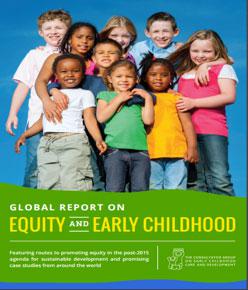The Consultative Group on Early Childhood Care and Development (CG) has recently published the Global Report on Equity and Early Childhood: Featuring routes to promoting equity in the post-2015 agenda for sustainable development and promising case studies from around the world”.
The Report provides an overview of the concept of equity in ECD and the surrounding literature (Ch1), the role of public policies in promoting equity in early childhood (Ch2), and equity concerns for young children who experience disability (Ch 3). Following these, 11 case studies from around the world are included in order to shed light on how equity issues play out in specific situations.
There are two case studies which address ‘equity’ by improving quality through workforce development. The two cases focus on national interventions for improving the quality of teachers and their pedagogies.
Case Study 4, “Addressing Equity and Quality Through Investing in the ECD Workforce: Namibia’s Challenges and Achievements” focuses on developing the early childhood workforce in Namibia. Since 1996, the country has been building a national, integrated set of early childhood policies and legal frameworks, with a strong emphasis on building equity across poverty lines. As in many countries, however, increases in access have not been accompanied by improvements in the quality of services. In particular, the workforce is starkly different in terms of qualifications and remuneration between the younger (birth to 4 years) and older (5 to 9 years) age groups. The authors report on several strategies to address workforce challenges through in-service training, distance-learning, motivation and retention incentives, and improved pedagogical and teaching practices.
Case Study 5: “Continuous Quality Improvement and Collaborative Learning to Improve Adaptability and Scalability in a Professional Development Programme for Pre-School Teachers in Chile” discusses the creation of a national integrated early childhood programme in Chile, which attempted to close the gaps between rich and poor households in terms of developmental delays, social–emotional problems and language delays. Participation in early childhood education increased tremendously as a result, especially among the poor, such that by 2012 73% of 4-year-olds and 93% of 5-year-olds were enrolled in pre-school and kindergarten, respectively. As in Namibia, however, concerns were raised about the quality of children’s experiences as well as the quality of the workforce, and the programme had minimal impact on child development outcomes. The authors describe an innovative approach that was developed in response to this problem, which engages teachers in applying specific changes, such as new pedagogical methods or other evidence-based changes. Teachers are then enabled to monitor the change’s efficacy and make improvements through a continuous quality improvement (CQI) model.
The Report is available here.
June 2016
Consultative Group on Early Childhood Care and Development
For inquiry, please email at: cgsecretariat2015@gmail.com

